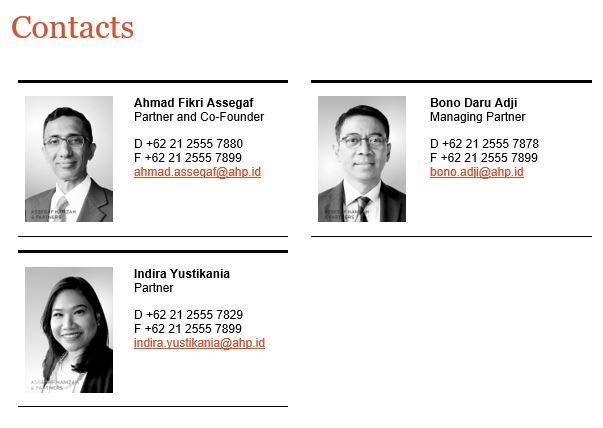More Clarity Expected as OJK Issues New Rule on Bank’s Corporate Actions
The Financial Services Authority (Otoritas Jasa Keuangan or “OJK“) issued OJK Regulation No. 41/POJK.03/2019 on Merger, Consolidation, Acquisition, Integration and Conversion of Commercial Banks (“Regulation“) at the end of last year. The Regulation revokes Bank Indonesia decrees No. 32/50/KEP/DIR on Requirements and Procedures to Purchase Shares of Banks and No. 32/51/KEP/DIR on Requirements and Procedures of the Merger, Consolidation and Acquisition of Banks.
In the Regulation, OJK governs the process and procedure of merger, consolidation, acquisition, integration and conversion (collectively, “corporate actions“) of commercial banks. Highlights of the Regulation includes a new criteria of acquisition, which may present robust opportunity for investors and commercial banks. In addition, the Regulation also allows OJK to play an extensive role in monitoring bank’s corporate actions.
Below are some discussion worthy points from the Regulation:
- OJK’s Role
The Regulation gives a major role to OJK in supervising banks’ corporate actions. Among others, banks must provide comprehensive documentation to OJK and obtain clearance before proceeding with the formalities of the relevant corporate action. For the formal process itself, the Regulation mainly still follows Government Regulation No. 28 of 1999 on Merger, Consolidation and Acquisition of Banks.
- Wider Criteria of Acquisition
Casting a wider net compared to the previous regime, an acquisition would only be triggered if the acquiring party ends up owning more than 25% shares in the bank. In addition, the Regulation deems the following actions as an acquisition despite a shareholder owning less than 25% shares if:
- such shareholder owns the highest shareholding percentage compared to the other shareholders; or
- such shareholder has control over the acquired bank e.g. through the ability to appoint members of the board of directors and/or board of commissioners of the bank.
- Integration or Conversion of a Foreign Bank’s Branch Office into a Local Commercial Bank
Under the Regulation, the assets and liabilities of a foreign bank’s branch office can now be transferred (defined as “integration” under the Regulation) to a local commercial bank. The local commercial bank can either be a conventional commercial bank or a Sharia commercial bank. The integration process is quite similar with other corporate actions and is commenced with the submission of an application to receive OJK’s clearance. As with other corporate actions, parties undertaking an integration will also be subject to a public disclosure obligation.
The Regulation also allows a foreign bank’s branch office to be converted into a local commercial bank. This process involves the revocation of the foreign bank’s branch office business license and issuance of a new banking business license. Similar to integration, OJK’s approval is also required for a conversion.
- Conversion of a Conventional Commercial Bank into a Sharia Commercial Bank
A merger, consolidation and acquisition between a conventional commercial bank and a Sharia commercial bank is now possible, albeit being a highly regulated process under the Regulation. As with other corporate actions, OJK’s approval must first be obtained by the relevant parties.
Further, the resulting Sharia bank must settle the rights and obligations of the conventional bank within one year after OJK grants its approval for the merger. If more time is required, then the parties must obtain OJK’s approval.
- Online Submission
To simplify the process, the Regulation allows documentation and application for banks’ corporate actions to be submitted online. As at the date of this update, the OJK is still developing the online submission system.
Banks that have announced their merger, consolidation, acquisition or integration process prior to the enactment of the Regulation (i.e. 26 December 2019) will still be subject to the previous regime.
By enacting the Regulation, the OJK aims to encourage banks, especially smaller ones, to consolidate. But while the front-loaded process is designed to give more clarity, clients will need to spend more time in the beginning, especially in filing documentation to the OJK, to ensure that their transactions will be smooth and successful.

***
AHP Client Alert is a publication of Assegaf Hamzah & Partners. It brings an overview of selected Indonesian laws and regulations to the attention of clients but is not intended to be viewed or relied upon as legal advice. Clients should seek advice of qualified Indonesian legal practitioners with respect to the precise effect of the laws and regulations referred to in AHP Client Alert. Whilst care has been taken in the preparation of AHP Client Alert, no warranty is given as to the accuracy of the information it contains and no liability is accepted for any statement, opinion, error or omission.

